Building a chicken coop can be an extremely easy, fun, and educational experience for your family. However, it can also be a challenging and stressful experience if you don’t know where to start. There’s a lot to keep track of when building your own chicken coop, and every step is extremely important for keeping your […]
Continue ReadingWhy Do We Call the Turkey a Turkey?
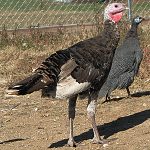
Wild turkeys, indigenous to the Americas, were kept by Native Americans for centuries before the arrival of Europeans. Early Spanish explorers are credited with transporting American turkeys to Europe. There the birds were selectively bred for a couple of centuries before being brought back to America by early settlers. From those birds sprang the domestic […]
Continue ReadingWhat to Do with Wooden and Ceramic Eggs
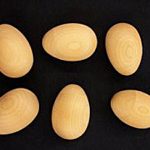
Wooden and ceramic eggs have lots of uses, ranging from enouraging hens to lay in the nests you provide, to creating stunning home decorations, to keeping kids busy with fun and educational activities. Here are just some of the countless things people do with wooden and ceramic eggs: Nest Eggs A “nest egg” is a […]
Continue ReadingWhat Kind of Music Do Chickens Like?
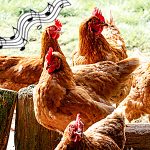
British farmer Glenn Haggart is the latest to discover that playing music for laying hens reduces anxiety and stress, creating a safer environment for the chickens. After four years of playing music for his layers, he’s become a strong advocate. But what kind of music do chickens like? Music and Chicks Let’s start with embryos […]
Continue ReadingWhich Is Best for Meat: Cornish Broiler or Heritage Breed?
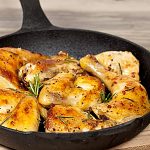
Raising chickens for meat involves first deciding which to choose: Cornish broilers or a heritage breed. The fundamental difference is the amount of time needed to grow them from hatch to harvest. The quicker they grow to the target weight of about six pounds, the cheaper they are to raise and the more tender the […]
Continue ReadingHow to Keep Guinea Fowl from Flying Away
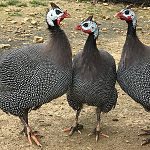
Guinea fowl are notorious for flying away, never to return. The problem is most likely to occur when guineas are moved to a new and unfamiliar location. Guinea fowl can be more easily encouraged to stay on the home place where they are raised. But getting them to stick around is more difficult when they […]
Continue ReadingGuinea Fowl on Tick Patrol
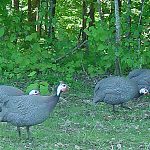
Many rural folks keep guinea fowl primarily to patrol for ticks and any other pesky insects they might snack on. When allowed to roam freely, a flock of guineas will effectively patrol a lawn, pasture, or edge of a woodlot. Just start up your lawn mower and guineas will gather to feast on whatever the […]
Continue ReadingPenning a Hen with Her Chicks
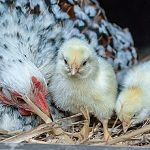
If a hen and her newly hatched chicks are left to wander around the poultry yard, the babies may fall prey to house cats, hawks, and other predators. And baby chicks can slip through most yard fences that are properly built to confine mature poultry. Chicks wandering around a yard can get chilled in damp […]
Continue ReadingBreed Spotlight: Frizzle, Frazzle, and Sizzle Chickens
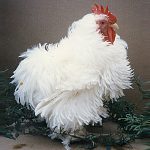
Frizzle chickens are fun and funny, but are they a breed? The answer is yes and no. In Australia, France, Germany, Ireland, Italy, and United Kingdom Frizzles are classified as a pure breed. In the United States they are considered to be a plumage variety in any breed. Frizzle Chickens Frizzling is a genetic condition […]
Continue ReadingAll Chicken Keepers Face These 3 Challenges

Chicken keepers vary in levels of experience, from novice to expert. But no matter how knowledgeable we might be, and how carefully we manage our flocks, all chicken keepers face the same three challenges. Predators Everyone who keeps poultry sooner or later experiences that heart-stopping moment of realization that a predator has come to call. […]
Continue Reading
